Lady Sends Dog Phobic Sister-In-Law Away After She Screamed At Her Dog For Licking Her Child
Some dog owners adore their four-legged companions so much that they treat them as if they were children. Some even prefer their dogs over certain friends and family.
If you love dogs as much as I do, you've probably been asked this question before: Why do you love and prioritize dogs over human well-being?
This is exactly the situation that this Redditor, SettingReady8137, who loves and adores her furry buddy, Dove, found herself in. This Redditor shared her story with the AITA community after a dispute arose in her family concerning her dog.
This original poster's sister-in-law, who has a serious dog phobia, came over to their house with a toddler around the age of three. According to the OP, Dove is very friendly with people, especially kids, and he enjoys playing with them and licking their legs.
As you might expect, the sister-in-law started fretting when Dove was playing with her toddler and licking her legs. At one point, the sister-in-law shouted at the dog, and this didn’t sit well with the OP.
We have compiled snapshots from the original post for you to read how the entire story unfolded, leading to the OP ordering her sister-in-law to leave her house instantly with her child. Scroll down to read them.
The AITA community was divided in their opinions over this story. You'll also see what they had to say.
The headline...

My older brother's wife came around to visit
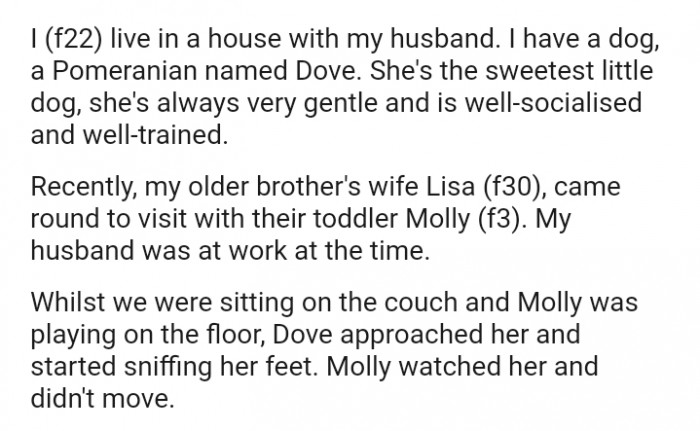
There's nothing to worry about as Dove is gentle
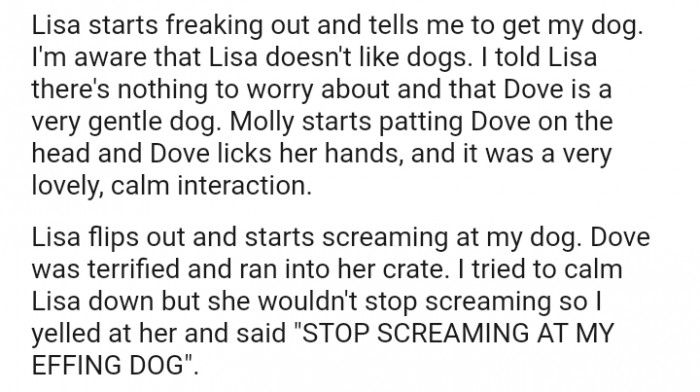
Understanding Phobias and Emotional Reactions
This incident highlights the complexities of phobias and their impact on interpersonal relationships. According to Dr. David Barlow, a leading expert on anxiety disorders, phobias often stem from learned experiences and can lead to intense emotional reactions.
The sister-in-law's response to the dog reflects a fear response that may not be fully understood by those around her, emphasizing the need for empathy in such situations.
Understanding Phobias and Their Impact
Dr. Linda Graham, a psychologist specializing in anxiety disorders at Columbia University, explains that specific phobias, such as fear of dogs, stem from complex interactions between genetics and personal experiences.
Her research indicates that individuals with phobias often have heightened sensitivity to perceived threats, which can lead to avoidance behaviors that affect their social interactions.
This situation highlights how phobias can create tension in relationships, especially when one partner's fears are not understood by the other.
I was being heartless and prioritizing my dog
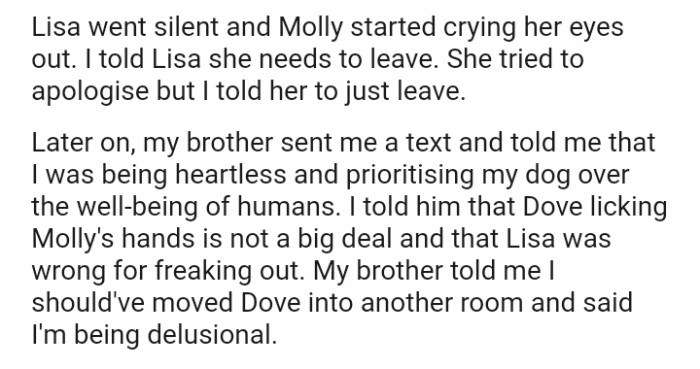
Redditors were torn in their decisions. Some didn't see the OP at fault, some blamed the OP, while others blamed everyone in the story.
Here are some of their topmost replies...
1. Seems she has an irrational fear of dogs
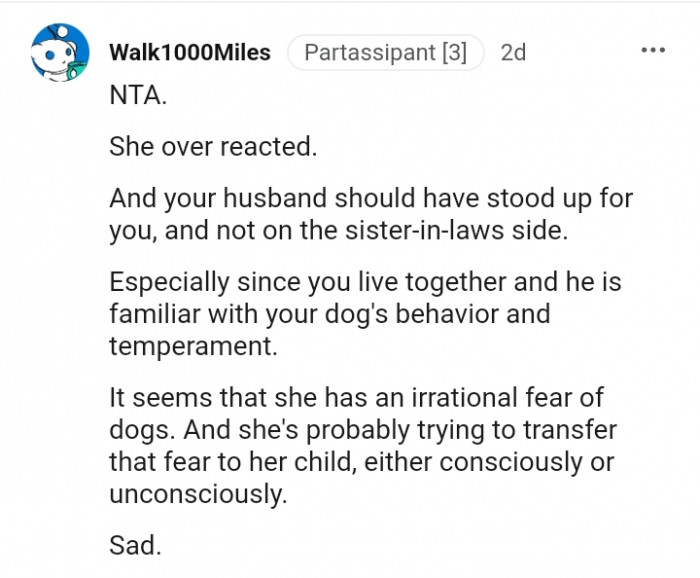
2. She should have picked the child off the floor
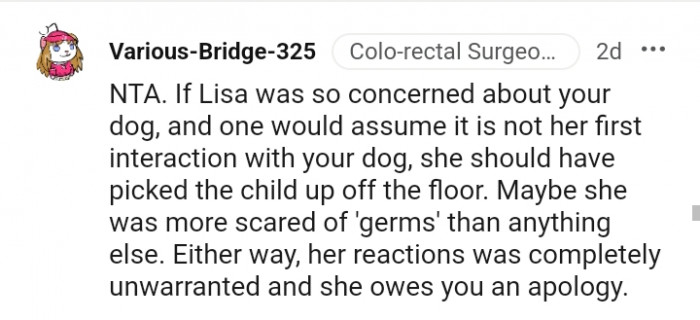
Research indicates that phobias can significantly affect social interactions and relationships. A study published in the Journal of Anxiety Disorders found that individuals with phobias often experience heightened anxiety in social situations, which can lead to avoidance behaviors.
In this case, the sister-in-law's fear may lead her to react strongly to the dog, causing tension within the family.
Studies show that phobias can trigger intense emotional responses, causing individuals to react disproportionately to their fears.
According to research published in the Journal of Anxiety Disorders, understanding the origins of these fears can help partners empathize with each other's experiences.
In this case, the sister-in-law’s reaction may have been driven by her deep-seated fear rather than an intentional desire to harm the child.
3. The best outcome for all parties involved

4. She clearly communicated her fears and boundaries
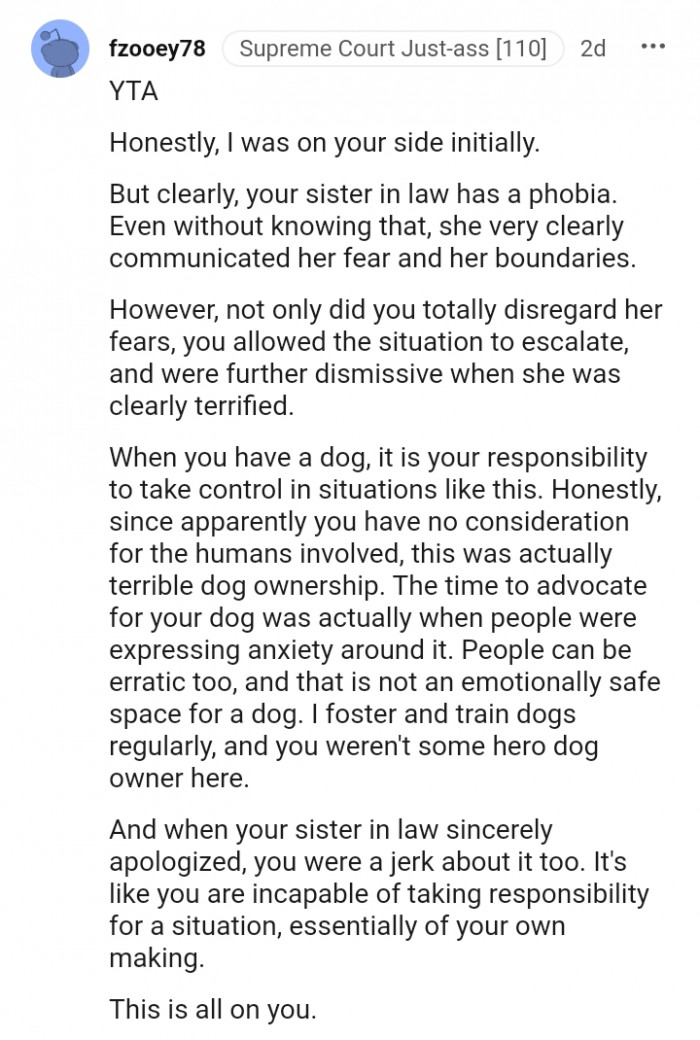
5. She doesn't trust dogs around her child
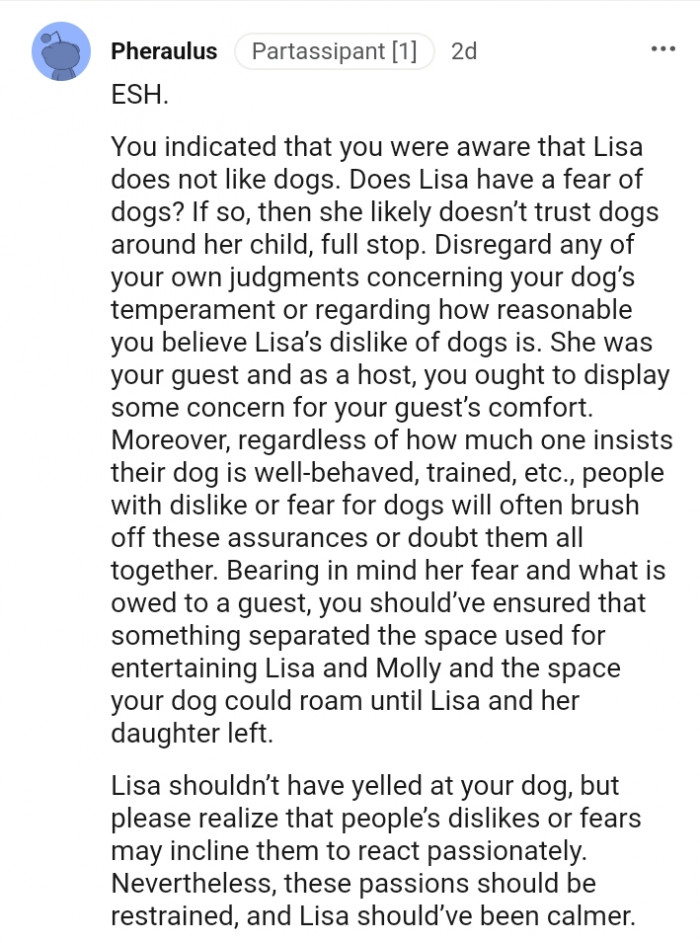
The Role of Empathy in Family Relationships
Empathy is vital in navigating conflicts arising from phobias. According to Dr. Marshall Rosenberg's Nonviolent Communication framework, understanding and acknowledging each other's feelings can diffuse tension and foster mutual respect.
In this scenario, recognizing the sister-in-law's fear as a legitimate experience rather than an overreaction can create space for constructive dialogue.
The Importance of Empathy in Relationships
Empathy plays a crucial role in understanding and supporting partners with phobias.
Psychologists emphasize that acknowledging each other's emotional states can foster a sense of safety and connection.
This situation demonstrates the need for open communication to navigate fears without judgment.
6. Molly seems to like dogs

7. She should have just picked her and left
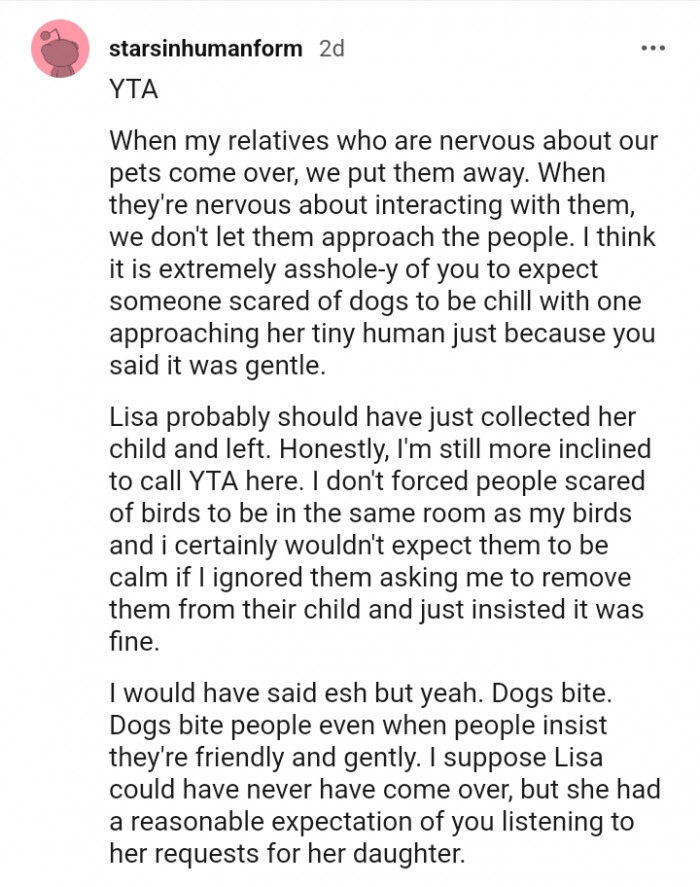
8. You should have kept your dog away
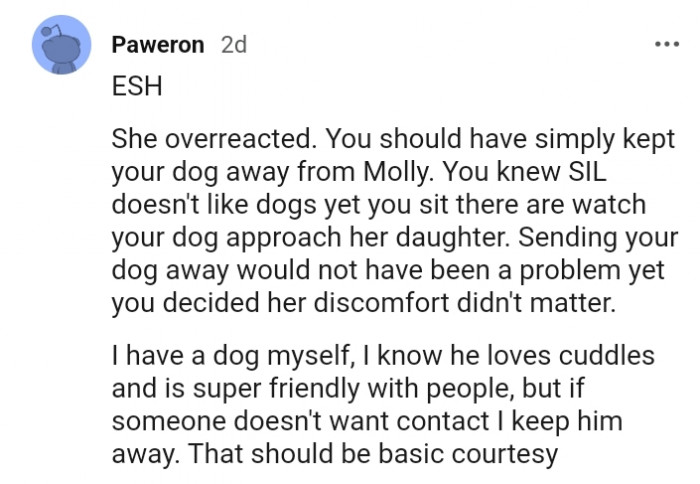
To improve family dynamics, it may be beneficial to have an open conversation about the sister-in-law's phobia, allowing her to express her feelings without judgment. This can help other family members understand her perspective and work together to find solutions that respect her boundaries while allowing for the dog's presence.
Creating a supportive environment can lead to healthier family relationships and reduce conflict related to phobias.
Creating a supportive environment involves actively listening to each other's fears and concerns.
Research suggests that couples who practice empathy report higher relationship satisfaction.
Listening without judgment can help both partners feel valued and understood, which is essential for navigating emotional challenges.
9. You should have called your dog away
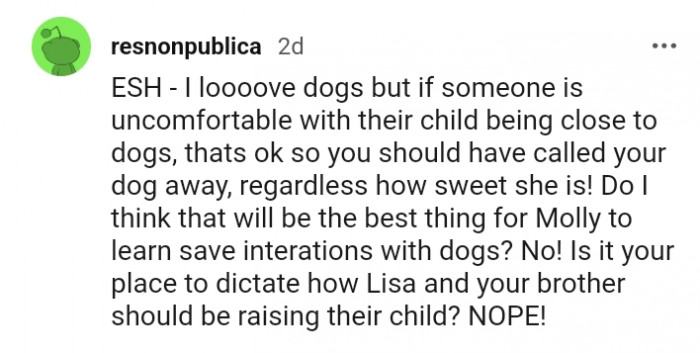
10. She asked you to remove your dog
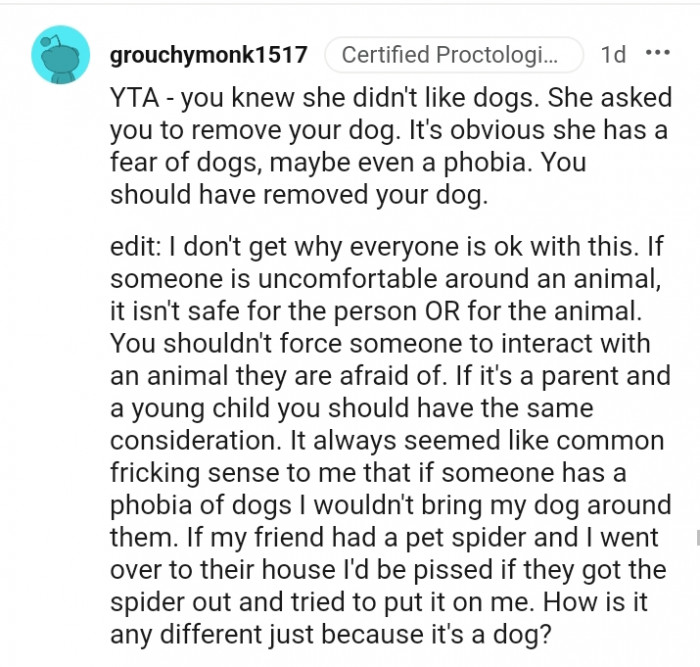
11. Why could you not put a stop?

Strategies for Managing Phobias in Relationships
When one partner has a phobia, it’s important to establish boundaries that honor both partners' needs.
Establishing clear guidelines for interactions with pets can help create a sense of safety for those with phobias.
Research in behavioral therapy suggests that gradual exposure to feared stimuli, in a controlled manner, can help reduce anxiety over time.
12. She needs to stay where there are no dogs

13. She shouldn't have yelled at the dog

14. You can't simply ignore their issues
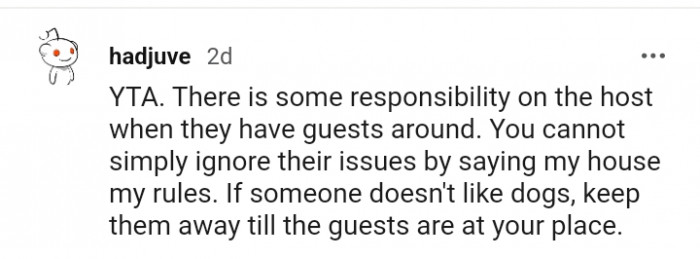
Therapists often recommend creating a plan for managing situations that may trigger phobic reactions.
By discussing potential triggers and strategies for coping, couples can navigate these situations more effectively.
Building a toolkit of coping strategies can empower both partners to feel more confident in managing their emotional responses.
15. He's defending his wife but he's gone too far

16. Toxicity in the building

17. The overdramatic version of the interaction

Building Trust in Relationships
Trust is fundamental in any relationship, especially when dealing with fears and anxieties.
Research shows that couples who nurture trust through open dialogues about fears and boundaries experience stronger relationships.
Being transparent about feelings and experiences can foster deeper connections and understanding.
18. They should agree to your rules if they want to come
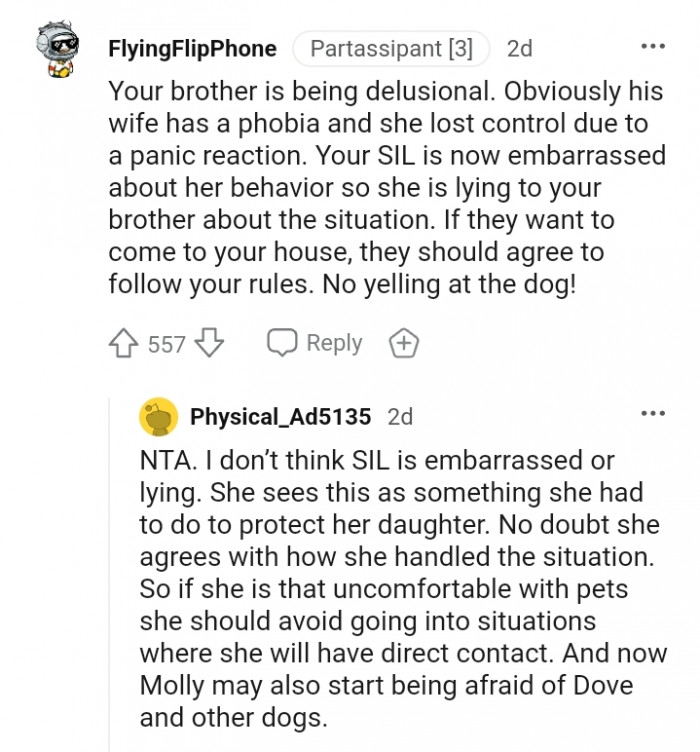
19. Your SIL was clearly uncomfortable about dogs
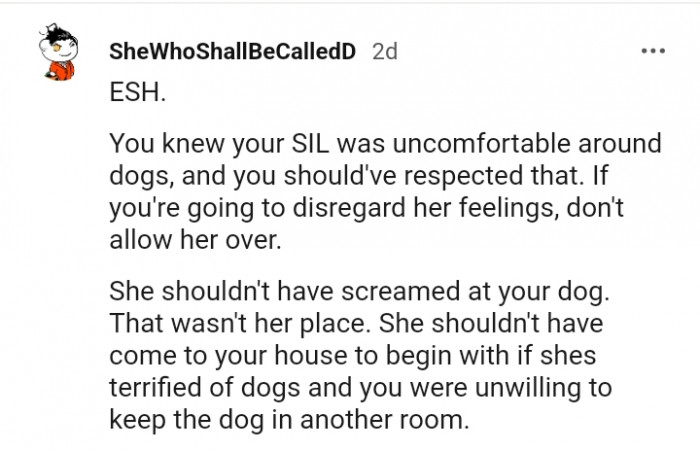
20. She set a boundary that you ignored
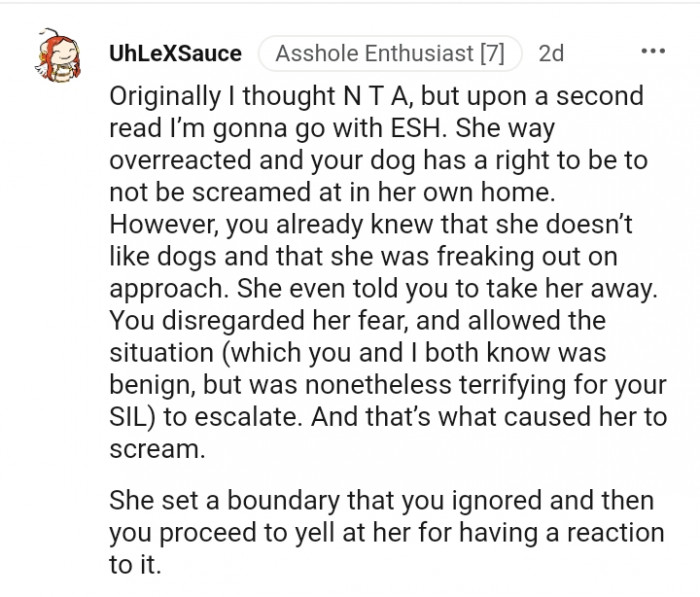
Setting aside time for discussions about fears can strengthen the emotional bond between partners.
Regular check-ins can help both partners feel heard and valued, reducing misunderstandings and fostering empathy.
Ultimately, creating a safe space for expressing fears can enhance relationship satisfaction and emotional intimacy.
Every dog owner understands his or her furry friend on a deeper level, and they are very confident about their dog’s behavior around people. However, this confidence is often lacking among those with dog phobia.
No matter how you reassure people with dog phobia about how safe they are around your dog, they will definitely fret, especially when they are in your home. This is exactly when discretion is needed to at least make your guest comfortable.
Psychological Analysis
This situation highlights how specific phobias can impact interpersonal dynamics.
When one partner feels their fears aren’t understood, it can lead to significant emotional distress.
Prioritizing empathy and communication about these fears is essential for maintaining a supportive relationship.
Analysis generated by AI
Analysis & Alternative Approaches
This scenario illustrates the complexities of navigating phobias within relationships.
By prioritizing empathy and open communication, couples can effectively manage fears and strengthen their bond.
Ultimately, fostering understanding and support will lead to healthier relationship dynamics.
Analysis & Alternative Approaches
Phobias can create significant challenges in family relationships, often leading to misunderstandings and tension. Understanding the psychological basis of these reactions can foster empathy and improve communication.
By prioritizing open dialogue and respect for each other's experiences, families can navigate conflicts more effectively and enhance their relational dynamics.



